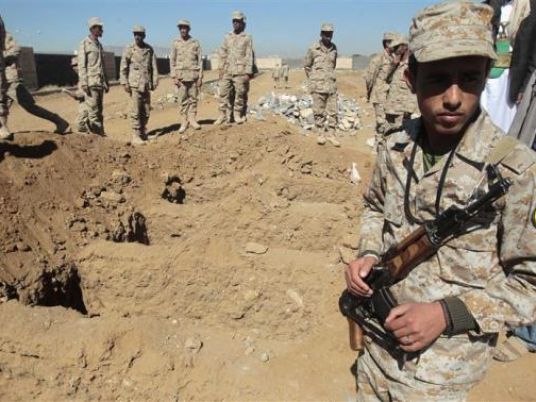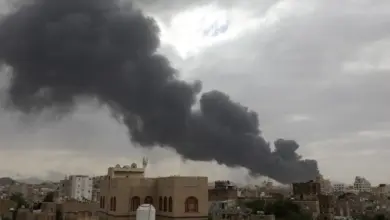
Brazen al Qaeda attacks on top government targets in Yemen are unlikely to abate while security services remain divided, ill-equipped and infiltrated by militants, and efforts to repair the country's fractured political life remain stalled.
An al Qaeda-affiliated group attacked the defense ministry in Sanaa on Thursday, killing 56 people, in a harsh reminder that extremist groups are able to operate in heavily secured areas of the capital despite a security crackdown.
It was the worst such attack in 18 months, heightening concerns about threats emanating from a country that flanks international shipping lanes and shares a long border with the world's top oil exporter, Saudi Arabia.
Responsibility for the attack was claimed by Ansar al-Sharia (Partisans of Islamic Law), an offshoot of al Qaeda in the Arabian Peninsula (AQAP), which is among the most active arms of the global jihadi network and wants to topple the government and impose its own strict version of Islamic law.
Analysts and officials see no early end to the violence.
“This demonstrates the seriousness of … terrorist attacks, it demonstrates that al Qaeda obviously has planners, and executors and capabilities,” Yemen's Foreign Minister Abu Bakr al-Qirbi told Reuters on the sidelines of a security conference in the Bahraini capital Manama.
Islamist insurgents took advantage of the chaos of former President Ali Abdullah Saleh's overthrow after months of mass protests in 2011 to seize several southern cities, but were driven out in a government offensive a year later aided by U.S. drone strikes.
But divisions within Yemen's security services – loyal to rival Yemeni leaders, including Saleh himself – have made it all the more difficult to confront the militants.
The security services also have to contend with fighting southern secessionists and a rebellion in the north that has flared up in recent weeks, killing more than 100 people.
INFILTRATION
“If al Qaeda is indeed responsible (for the defense ministry attack), which seems likely at this point, it sends a strong message that they can strike where the government is strongest,” the International Crisis Group's senior Yemen expert April Longley Alley told Reuters.
“Looking ahead, these attacks are likely to continue and even increase in frequency as long as there is no strong political settlement and the military-security services remain divided and weak,” she said.
Qirbi said that while infiltration of AQAP into the security forces was a concern, the more urgent issue was providing personnel with desperately needed training and equipment such as helicopters and vehicles.
“Infiltration is present, because this is the tactic terrorist organizations use to penetrate … and we have to be aware of that,” he said.
“We have to revise the way we deal with (attacks), not just intelligence and security, and there is a weakness in that regard, especially that Yemen, which is subjected to these terrorist attacks, is not getting enough support,” he said.
Yemen has also been hit by a rash of drive-by assassinations, the latest of which involved gunmen on a motorbike who shot dead two military instructors from Belarus.
The spokesman for the interior ministry, Mohamed al-Qaadi, said security services had taken increased measures to combat the assassinations, including a campaign to confiscate weapons as well as vehicles that do not carry legal registration.
This campaign has resulted in the confiscation of 800 weapons, 1,000 cars and 3,500 motorcycles, Qaadi said, adding that security services had also banned the use of motorcycles “after they turned into an instrument to kill”.
But even Qaadi said political progress was needed to stabilize the country, one of the world's poorest.
FRACTURED, OVERSTAFFED, UNDERPAID
President Abd-Rabbu Mansour Hadi, installed under a Gulf and Western-backed plan to ease Saleh from power, has purged the army of many Saleh loyalists.
But deeper reform has not happened.
“Instead, the two-year transition has effectively fractured the security services even further, now around a wider array of party and political loyalties,” Alley said.
“Also the most elite units, many of which were loyal to the Salehs, have been disbanded … producing a further strain on capacity. As it stands, the security forces are deeply fractured, overstaffed, underpaid and largely demoralized.
Instability has also been fuelled by a lack of progress in National Dialogue talks intended to bring in a new constitution and democratic reforms within a two-year interim period.
Principle disagreements are demands for more autonomy by separatists from the former South Yemen, which merged with North Yemen in 1990. A group of them quit the talks last month while the U.N. envoy for Yemen accused members of Saleh's party of obstructing the negotiations. They deny the allegations.
Elections, which were envisioned for 2014, will now be delayed indefinitely.
Faris al-Saqqaf, an adviser to Hadi, said al Qaeda had exploited the instability created by political "spoilers" who sought to derail the National Dialogue talks.
Alley said until there was political agreement on how to move forward with the transition, the security situation would likely deteriorate further.
“Even if there is a political consensus on the way forward, it will take time to build new institutions and reverse strong centrifugal forces pulling the country in different directions.”



